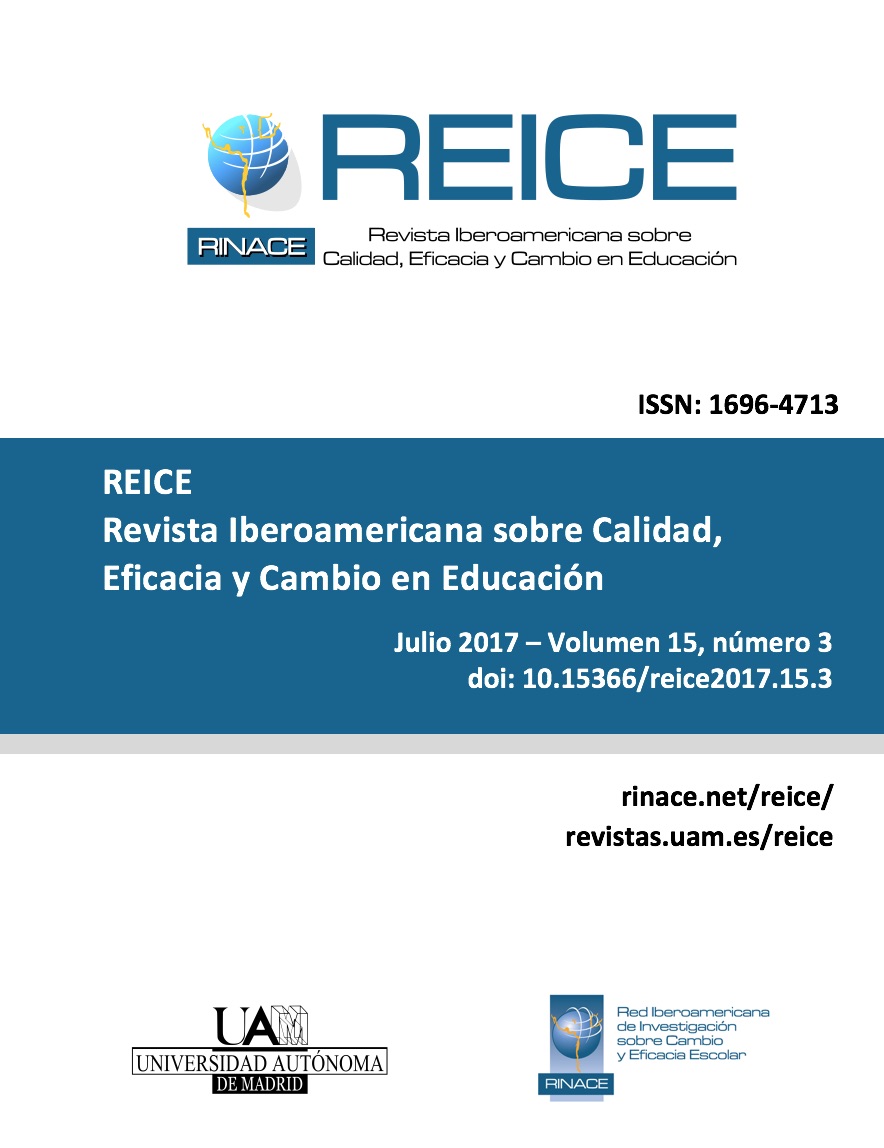Keywords:
Educational opportunities, Learning, Mathematics, Academic achievement.Abstract
In order to know the relationship between learning opportunities (otl) and achievement of the mathematics of Mexican students, and using the database of pisa 2012, multiple regression analysis and structural modeling were performed, where the predictor variables Were four types of otl and the socio-economic and cultural status of the students, and the variable to predict was the standardized score in the pisa test. The otl analyzed were the following: Experience with conceptual problems (algebra tasks), Experience with tasks that require procedures, 3) Experience with pure mathematical reasoning (geometry tasks), and 4) Experiences with mathematical reasoning. The results show that otl related tasks requiring procedures predict achievement in mathematics positively. On the contrary, otl related to pure mathematical reasoning predict achievement in mathematics negatively. The results also showed that the Mexican students evaluated report having more frequent experiences in teaching than evaluation activities. Likewise, the index of socioeconomic and cultural status (escs) predicted significantly, and positively, the achievement in mathematics, although it did not change the relationship that otl have with the learning of mathematics.
Downloads
References
Bove, G., Marella, D. y Vitale, V. (2016). Influences of school climate and teacher’s behavior on student’s competencies in mathematics and the territorial gap between Italian macro-areas in PISA 2012. Journal of Educational, Cultural and Psychological Studies, 13, 63-96. https://doi.org/10.7358/ecps-2016-013-bove
Carroll, J. (1963). A model of school learning. Teacher College Record, 64, 723-733.
Carroll, J. (1989). The carroll model: A 25-year retrospective and prospective view. Educational Researcher, 18(1), 26-31. doi: https://doi.org/10.3102/0013189X018001026
Coleman, J. S. (1967). The concept of equality of educational opportunity. Baltimore, MD: Johns Hopkins University.
Cueto, S., Guerrero, G., León, J., Zapata, M. y Freire, S. (2014). The relationship between socioeconomic status at age one, opportunities to learn and achievement in mathematics in fourth grade in Perú. Oxford Review of Education, 40(1), 50-72. https://doi.org/10.1080/03054985.2013.873525
Cueto, S., León, J., Ramírez, C. y Guerrero, G. (2008). Oportunidades de aprendizaje y rendimiento escolar en matemática y lenguaje: Resumen de tres estudios en Perú. REICE. Revista Iberoamericana sobre Calidad, Eficacia y Cambio en Educación, 6(1), 29-41.
Elliott, S. N. (2015). Measuring opportunity to learn and achievement growth: Key research issues with implications for the effective education of all students. Remedial and Special Education, 36(1), 58-64. https://doi.org/10.1177/0741932514551282
Haertel, G. D., Walberg, H. J. y Weinstein, T. (1983). Psychological models of educational performance: a theoretical synthesis of constructs. Review of Educational Research, 53(1), 75-91. https://doi.org/10.3102/00346543053001075
INEE. (2012). Programa internacional para la evaluación de los estudiantes OCDE PISA 2012. Cuestionario del estudiante – Forma C. Ciudad de México: INEE
Jensen, B., Pérez, M. G. y Aguilar, A. (2015). Framing and assessing classroom opportunity to learn: the case of Mexico. Assessment in Education: Principles, Policy & Practice, 23(1), 149-172. doi: https://doi.org/10.1080/0969594X.2015.1111192
McDonell, L. (1995). Opportunity to learn as a research concept and a policy instrument. Educational Evaluation and Policy Analysis, 17(3), 305-322.
https://doi.org/10.3102/01623737017003305
OCDE. (2013). PISA 2012 assessment and analytical framework: Mathematics, reading, science, problem solving and financial literacy. París: OECD Publishing. https://doi.org/10.1787/9789264190511-en
Planas, N. (2014). One speaker, two languages: Learning opportunities in the mathematics classroom. Educational Studies in Mathematics, 87(1), 51-66. https://doi.org/10.1007/s10649-014-9553-3
Schmidt, W. H., Burroughs, N. A., Zoido, P. y Houang, R. T. (2015). The role of schooling in perpetuating educational inequality an international perspective. Educational Researcher, 44(7), 371-386. https://doi.org/10.3102/0013189X15603982
Schmidt, W. H. y McKnight, C. C. (1995). Surveying educational opportunity in mathematics and science: An international perspective. Educational Evaluation and Policy Analysis, 17(3), 337-353. https://doi.org/10.3102/01623737017003337
Schmidt, W. H., Zoido, P. y Cogan, L. (2014). Schooling ,atters: Opportunity to learn in PISA 2012. París: OECD Publishing. https://doi.org/10.1787/5k3v0hldmchl-en
Shahrill, M. y Clarke, D. J. (2014). Brunei teachers' perspectives on questioning: Investigating the opportunities to" Talk" in mathematics lessons. International Education Studies, 7(7), 1-7. https://doi.org/10.5539/ies.v7n7p1
Stacey, K. (2015). The international assessment of mathematical literacy: PISA 2012 framework and items. En S. J. Cho (Ed.), Selected regular lectures from the 12th International Congress on Mathematical Education (pp. 771-790). Seúl: Springer International Publishing.
Stevens, F. I. (1993). Applying an opportunity-to-learn conceptual framework to the investigation of the effects of teaching practices via secondary analyses of multiple-case-study summary data. The Journal of Negro Education, 62(3), 232-248. https://doi.org/10.2307/2295463
Stevens, F. I. (octubre, 1996). The need to expand the opportunity to learn conceptual framework: Should students, parents, and school resources be included? Comunicación presentada en Conference of the American Educational Research Association. Nueva York, NY.
Stevens, F. I., Wiltz, L. y Bailey, M. (1998). Teachers' evaluations of the sustainability of opportunity to learn (OTL) assessment strategies. a national survey of classroom teachers in large urban school districts. Washington, DC: Office of Educational Research and Improvement
Wang, J. (1998). Opportunity to learn: The impacts and policy implications. Educational Evaluation and Policy Analysis, 20(3), 137-156. https://doi.org/10.3102/01623737020003137
Wiley, D. E. y Yoon, B. (1995). Teacher reports on opportunity to learn: Analyses of the 1993 California learning assessment system (CLAS). Educational Evaluation and Policy Analysis, 17(3), 355-370. https://doi.org/10.3102/01623737017003355
